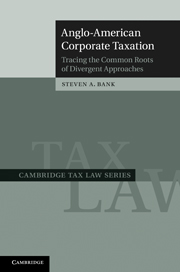7 - 1970s to Present – A Time of Convergence?
from Part III - Conclusion
Published online by Cambridge University Press: 07 October 2011
Summary
The three themes discussed in the previous chapters – profits, power, and politics – have each continued to influence the modern debate over corporate tax reform in the United Kingdom and the United States during the last twenty years. American politicians have maintained their focus on the paucity of dividends and the actions of managers while their British counterparts revived their concern about shareholder expropriation and inadequate retained earnings. Moreover, political changes have ushered in dramatic reforms in both countries, although in the case of the USA the modification to the tax treatment of dividends that was ultimately enacted in 2003 was once again less radical than the original proposal and fell short of the goal of full integration. In the latest round of reforms, these common themes seem to be pushing the two systems toward convergence rather than divergence, which seems predictable in light of the growth of multinational corporations and the globalization of commerce. What is uncertain, however, is the effect of developments outside of each country, such as the growing power of the European Union, the European Court of Justice, and other countries, in dictating whether convergence is inevitable or even possible.
United Kingdom
In the mid 1990s, the UK once again became concerned with dividends and firm investment. A 1995 study published by the Institute for Fiscal Studies (“IFS”) announced that there had been a dramatic rise in the percentage of profits paid out as dividends during the previous decade. In a press release accompanying this announcement, the IFS noted that “[t]he dividend payout ratio . . . is higher in the UK than in any other major economy. There is a danger that these high dividend payouts are having an adverse effect on business investment.” Other studies reached similar conclusions regarding the dangers of increased dividends. By 1997, with dividends continuing to rise and Labour poised to retake power for the first time in eighteen years, the corporate tax system appeared to be headed for another revision.
- Type
- Chapter
- Information
- Anglo-American Corporate TaxationTracing the Common Roots of Divergent Approaches, pp. 223 - 249Publisher: Cambridge University PressPrint publication year: 2011

